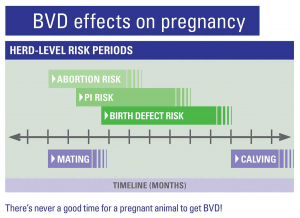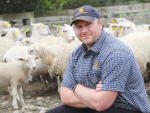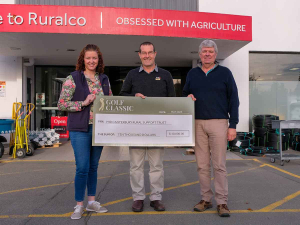BVD is a common but devastating viral infection of cattle.
Recent economic modelling by Massey University estimates BVD outbreaks in naïve beef herds cost more than $200 per cow*. BVD’s most costly impacts are on pregnant cattle and their unborn calves.
If pregnant cows are infected with BVD prior to 35 days of gestation, the pregnancy is usually lost. This can decimate next season’s calf crop. Between 35 and 125 days of gestation, BVD infection most often causes the calf to become persistently infected with the virus (“PI”). PIs shed BVD in their saliva, faeces and reproductive secretions for their entire lives and are the main source of BVD transmission to naïve cows or herds.
If a pregnant cow is infected with BVD beyond 125 days of gestation, sometimes her calf is born normal. However, it may also suffer birth defects – such as stunting, eye abnormalities, and immune suppression, which could limit its future productivity.
Because the costliest impacts of BVD are on pregnant cattle and their unborn calves, protecting heifers and cows from infection during mating and gestation is critical. You can do this through vigilant biosecurity, or by vaccinating prior to mating with a BVD vaccine demonstrated to provide foetal protection.
Biosecurity means preventing pregnant cattle from having contact with any animals of an unknown BVD status (potential PIs). To ensure good BVD biosecurity, all animals within your herd should be blood or ear-notch tested to see if they are PIs. If they are, they should be culled.
Animals from outside the herd – which may have contact with your pregnant cattle – should also be BVD virus tested negative. Barriers, such as boundary fences with outriggers, should be used to separate your pregnant cattle from untested animals. If you share yards or equipment with cattle of an unknown BVD status, cleaning and disinfecting between mobs – or spelling facilities for 7 days – will minimise the risk of BVD transmission.
If, like on most farms in New Zealand, strict biosecurity isn’t always possible – then vaccinating cows and heifers prior to mating each year with a vaccine (with a label claim for foetal protection) will help prevent transmission of BVD virus through the placenta to the calf. This means that even if the dam is exposed to BVD during pregnancy, her pregnancy should be protected.
All BVD vaccines available in New Zealand are killed vaccines, requiring two doses in the first year and annual boosters thereafter to continue to protect the vaccinated animal. However, each BVD vaccine has demonstrated different durations of protection for the vaccinated cow’s unborn calf.
For example, New Zealand’s leading BVD vaccine – Bovilis BVD – prevents the virus from infecting the vaccinated cow’s unborn calf for at least 6 months following the initial sensitiser and booster and at least 12 months following a third dose.
This is the longest demonstrated duration of foetal protection available in the country.
You can achieve year-round protection for your herd’s pregnancies by giving replacement heifers two shots of Bovilis BVD in their first year of life (as R1s) and all other cows and heifers an annual booster each year. This type of vaccination program is likely to be the most cost-effective way to control BVD for many New Zealand beef herds*.
Vaccinating with Bovilis BVD to maintain 12 months of foetal protection will help break the cycle of transmission, by covering the herd’s entire risk period for PI formation. It will also continue to protect pregnancies from the late gestation effects of BVD.
Furthermore, it allows for flexibility of annual booster timing. If you need to give your annual herd booster pre-calving rather than pre-mating, the subsequent mating’s pregnancies will still be protected from BVD.
There’s never a good time for a pregnant animal to get BVD. Protecting pregnant cattle throughout gestation, with biosecurity and/or vaccination, is the only way to break the cycle of BVD transmission in the long-term. It will also minimise the cost of BVD infection.
You should discuss your BVD vaccination options with your vet.
• Amanda Kilby is a technical veterinarian at MSD Animal Health
(*Reference: Han, JH. et al. (2020). Modelling the economics of bovine viral diarrhoea virus control in pastoral dairy and beef cattle herds. Massey University PhD Thesis.)



















